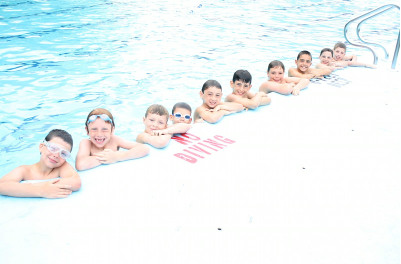Self Compassion
 One of the many great messages we communicate, as well as demonstrate, at Iroquois Springs is “be nice”. We value treating one another with kindness, respect and compassion. We know the message is well received by how welcoming and supportive our camp community is, and how many friendships develop at our summer home. But kindness doesn’t stop there. We also know the importance of Self-Compassion. The ability to be kind to yourself and give yourself the same understanding, support and encouragement you would give to a friend. The school year can be filled with countless demands and constant pressure to excel, and many children become easily frustrated and self-critical when they perform less than perfect. Camp is the perfect place to learn some self-compassion and accept ourselves with understanding and patience, flaws and all.
One of the many great messages we communicate, as well as demonstrate, at Iroquois Springs is “be nice”. We value treating one another with kindness, respect and compassion. We know the message is well received by how welcoming and supportive our camp community is, and how many friendships develop at our summer home. But kindness doesn’t stop there. We also know the importance of Self-Compassion. The ability to be kind to yourself and give yourself the same understanding, support and encouragement you would give to a friend. The school year can be filled with countless demands and constant pressure to excel, and many children become easily frustrated and self-critical when they perform less than perfect. Camp is the perfect place to learn some self-compassion and accept ourselves with understanding and patience, flaws and all.
Kristin Neff, Ph.D., of the University of Texas at Austin and author of Self-Compassion, describes self-compassion as “mindfulness of your own thoughts and feelings, a sense of a common humanity, and treating yourself kindly”. Self-compassion is associated with resilience, the ability to rebound in the face of difficulty, to pick oneself up when mistakes are made and keep trying. Children with very little self-compassion can experience upset and frustration when they make a mistake, and often refuse to try new things because they fear making a mistake. They overlook all of the wonderful accomplishments they have made and focus on the things they struggle with. Research finds that having self-compassion reduces depression and anxiety and increases motivation.
So how do we help young people learn to care for themselves by being less critical and kinder when faced with challenges? Some of the best teachers of self-compassion are camp counselors. Camp counselors, coaches and specialists teach the skills of self-compassion to help campers build resilience and the grit to give it their all, even when the going gets tough. Some effective ways to help children develop self-compassion at camp or anywhere include…
Praise the efforts, not the outcome. Praise the work put into being part of the team or activity, learning new skills, and being focused. The outcome may be less than perfect but the steps along the journey should be celebrated.
Remind them that they are okay even if a mistake is made. It’s impossible to get through life without making mistakes along the way. The best thing we can do is accept the mistakes and learn what we can from them for the next time.
Listen and acknowledge their fr ustration. It’s natural to feel frustrated, angry, or defeated after things go less than perfect. Listen and empathize, but encourage them to get back in the game, whatever “game” they are playing.
Share your own journey. Talk about your own mistakes and how you worked through them to help kids feel they are not alone.
 Focus on the positive. Sometimes it’s easier to focus on the mistakes instead of the accomplishments. When mistakes are made, help kids refocus on the accomplishments to build their determination. Remembering the good is part of learning self-compassion.
Focus on the positive. Sometimes it’s easier to focus on the mistakes instead of the accomplishments. When mistakes are made, help kids refocus on the accomplishments to build their determination. Remembering the good is part of learning self-compassion.
Christopher Germer PhD, a clinical psychologist once said “A moment of self-compassion can change your entire day. A string of such moments can change the course of your life”. So send the message to get involved, try your hardest, and be kind to yourself no matter what happens. Along with great accomplishments, mistakes are going to happen, but accepting them and ourselves is what matters.

